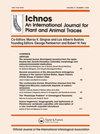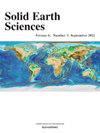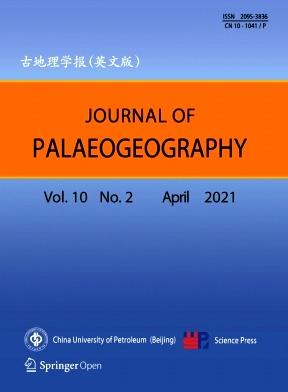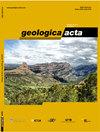中文名称:
Ichnos-植物和动物痕迹国际期刊
期刊缩写:
ICHNOS
影响因子:
2
ISSN:
print: 1042-0940
on-line: 1563-5236
on-line: 1563-5236
研究领域:
PALEONTOLOGY
创刊年份:
1990年
h-index:
34
自引率:
12.50%
Gold OA文章占比:
9.26%
原创研究文献占比:
100.00%
SCI收录类型:
Science Citation Index Expanded (SCIE) || Scopus (CiteScore)
期刊介绍英文:
The foremost aim of Ichnos is to promote excellence in ichnologic research. Primary emphases center upon the ethologic and ecologic significance of tracemaking organisms; organism-substrate interrelationships; and the role of biogenic processes in environmental reconstruction, sediment dynamics, sequence or event stratigraphy, biogeochemistry, and sedimentary diagenesis. Each contribution rests upon a firm taxonomic foundation, although papers dealing solely with systematics and nomenclature may have less priority than those dealing with conceptual and interpretive aspects of ichnology. Contributions from biologists and geologists are equally welcome.
The format for Ichnos is designed to accommodate several types of manuscripts, including Research Articles (comprehensive articles dealing with original, fundamental research in ichnology), and Short Communications (short, succinct papers treating certain aspects of the history of ichnology, book reviews, news and notes, or invited comments dealing with current or contentious issues). The large page size and two-column format lend flexibility to the design of tables and illustrations. Thorough but timely reviews and rapid publication of manuscripts are integral parts of the process.
CiteScore:
| CiteScore | SJR | SNIP | CiteScore排名 |
|---|---|---|---|
| 2.5 | 0.368 | 0.374 | 学科 排名 百分位 大类:Earth and Planetary Sciences 小类:Paleontology 59 / 113 48% |
发文信息
中科院SCI期刊分区
2025年3月20日发布
| 大类 | 小类 | TOP期刊 | 综述期刊 |
|---|---|---|---|
| 4区 地球科学 | 4区 古生物学 PALEONTOLOGY | 否 | 否 |
2023年12月发布
| 大类 | 小类 | TOP期刊 | 综述期刊 |
|---|---|---|---|
| 4区 地球科学 |
4区
古生物学
PALEONTOLOGY
|
否 | 否 |
WOS期刊分区
| 学科分类 |
|---|
Q4PALEONTOLOGY |
历年影响因子
| 2015年 | 0.9350 |
|---|---|
| 2016年 | 1.1820 |
| 2017年 | 1.0870 |
| 2018年 | 1.0430 |
| 2019年 | 1.4690 |
| 2020年 | 1.4380 |
| 2021年 | 1.4120 |
| 2022年 | 0.8000 |
| 2023年 | 0.8000 |
| 2024年 | 2.0000 |
历年发表
| 2016年 | 1 |
|---|---|
| 2017年 | 0 |
| 2018年 | 0 |
| 2019年 | 0 |
| 2020年 | 0 |
投稿信息
出版周期:
Quarterly
出版语言:
English
出版国家(地区):
UNITED STATES
审稿时长:
>12 weeks
出版商:
Taylor and Francis Ltd.
编辑部地址:
TAYLOR & FRANCIS INC, 325 CHESTNUT ST, SUITE 800, PHILADELPHIA, USA, PA, 19106
Ichnos-An International Journal for Plant and Animal Traces - 最新文献
Pleistocene fossil snake traces on South Africa’s Cape south coast
Pub Date : 2023-08-28 DOI: 10.1080/10420940.2023.2250062 Charles W. Helm, M. Bateman, A. Carr, H. Cawthra, Jan C. de Vynck, M. Dixon, M. Lockley, W. Stear, J. VenterFirst report of a Late Triassic dinosaur track from the Zigui Basin, Middle Yangtze region, China
Pub Date : 2023-08-28 DOI: 10.1080/10420940.2023.2250905 Long Cheng, Yang Li, W. Foster, Jean‐David Moreau, Chun-bo Yan, H. Yao, Chuanshang Wang, Lide ChenPossible shod-hominin tracks on South Africa’s Cape coast
Pub Date : 2023-08-28 DOI: 10.1080/10420940.2023.2249585 Charles W. Helm, M. Lockley, H. Cawthra, Jan C. de Vynck, M. Dixon, Renée Rust, W. Stear, Monique Van Tonder, B. Zipfel
免责声明:
本页显示期刊或杂志信息,仅供参考学习,不是任何期刊杂志官网,不涉及出版事务,特此申明。如需出版一切事务需要用户自己向出版商联系核实。若本页展示内容有任何问题,请联系我们,邮箱:info@booksci.cn,我们会认真核实处理。
本页显示期刊或杂志信息,仅供参考学习,不是任何期刊杂志官网,不涉及出版事务,特此申明。如需出版一切事务需要用户自己向出版商联系核实。若本页展示内容有任何问题,请联系我们,邮箱:info@booksci.cn,我们会认真核实处理。








